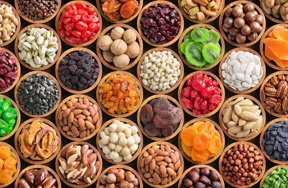You may have seen or heard the word before – ASPARTAME. An artificial sweetener, it’s one of the two most commonly used food additives in the products you buy from the grocery store and eat in restaurants. (The other is MSG). You may or may not think aspartame is necessary or unnecessary, tasty or disgusting, or harmful to your health or not. Whatever you think, it’s always best to get the facts about the things you put in your body – for your own health’s sake.
Sweet Subs
Thousands of different kinds of foods and drinks, especially diet products, contain artificial sweeteners, which can be called by any of the following names (and others not on this list):
- NutraSweet
- Equal
- Sweet and Low
- Splenda
- Sunette
These brand names cover up the real names of the additives, which include:
- Aspartame
- Saccharin
- Cyclamate
- Acessulfame-K
The fact is, some of the above additives had a very short run at popularity. Saccharin, for example, was found to cause cancer in lab animals – so it lost favor with consumers. It’s also been proven that, despite their use in diet products, all artifical sweeteners cause an increase in appetite – we think that’s just wrong.
No. 1 Additive
Today, aspartame is the No. 1 artificial sweetener added to foods. You’ll find it in everything from diet sodas, many packaged food products, medications, supplements and other items meant to be consumed (eaten or ingested) by human beings.
Unfortunately, aspartame also accounts for over 75% of negative reactions to food additives reported to the U.S. Food and Drug Administration.
Full of …
Aspartame is made of the following ingredients:
- 40% aspartic acid (an amino acid)
- 50% phenylalanine (another type of amino acid)
- 10% methyl alcohol OR methanol (wood alcohol)
One can of soda (12 oz.) sweetened with aspartame contains about 30 milligrams of methanol. And considering it doesn’t take much to exceed the daily limits of methanol your body can handle (as recommended by the Environmental Protection Agency), that’s a pretty scary amount.
Methanol is completely toxic to humans. Your body just doesn’t have the right kinds of enzymes needed to detoxify it. It takes five times longer to eliminate from your body than a similar amount of ethanol, which is the alcohol commonly found in beer, wine, whiskey and other alcoholic drinks. The ethanol found in certain foods (especially fruits) that naturally contain methanol works to protect your body against the harmful effects of the methanol. But aspartame doesn’t offer any of the same protection – at all.
Detoxify This
In order for your body to detoxify the wood alcohol (ethanol) in aspartame, it has to convert it to formaldehyde and then convert it again into something called formic acid – both of these are toxic metabolites that result in metabolic acidosis. When this happens, your body contains excess acidity and other health problems.
Scientists and researchers studying the effects of aspartame on the human body have also found that the additive could trigger or mimic other health problems like chronic fatigue syndrome, multiple sclerosis, hypothyroidism, Alzheimer’s, attention deficit disorder, epilepsy and many more. If this scares you, that's good. These are all serious health problems – people who suffer from them (whether it’s due to aspartame or something else) may very well spend most of their time, money and energy trying to cure themselves or adjusting to life with disease and illness.
Avoid Aspartame
The fact is, aspartame is not something that should be in our food. It does not occur naturally in food and our bodies just aren’t designed to deal with it properly. But don’t worry; there are some key things you can do to minimize your exposure to this harmful additive.
Read the label. Get into the habit of always reading the labels of everything you consider eating or drinking, or putting on your skin, hair and nails.
Ask the pharmacist. Some medications (including children's medicines), drinks, candy and gum may have hidden amounts of aspartame in them. Always ask your pharmacist or doctor what is in the medicine you are taking.
Avoid it and replace it. Avoid artificially sweetened foods, drinks, medications, supplements or anything made with them. Even foods and drinks sweetened with white sugar or other natural sweeteners are better for you than something artificially sweetened. And finally, if it says sugar-free, don’t even touch it! That’s a dead giveaway the product you are about to put in your body contains artificial sweeteners.
Related Stories:

































